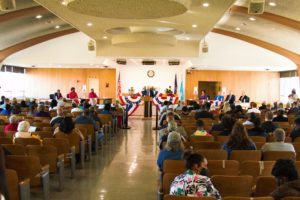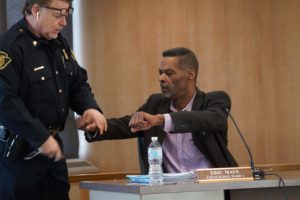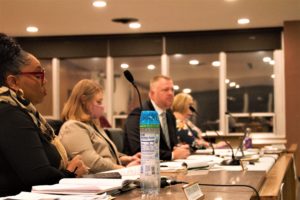By Tom Travis
This is not the usual city council article. No “news” here, just observations and commentary from a local city government beat community journalist. As editor, and supported by the board of East Village Magazine, this entire issue is dedicated to governance.
Specifically, this entire issue of East Village Magazine (EVM) is dedicated to good local governance. Our local city council has at times resorted to name calling, including calling each other “knuckleheads,” endless bickering and excruciatingly hours long meetings.

Flint City Council Chamber entrance on the third floor of city hall. (Photo by Meghan Christian)
One of my elective courses in high school was Civics and Current Events. That class drew me into a more keen interest into politics and government. As a young person I was fascinated by the goings on of government and elected officials.
One of my first political memories was sitting beside my dad while he sat in his chair in the living room reading the Flint Journal. On the front page were two large side-by-side photos of the resigning President Nixon and the in-coming President Ford, the only person to serve as president without being elected by the voters.

Flint Journal cover (Photo source: Tom Travis)
I would ask my parents questions about politicians and world events as we watched the news together. My mother suggested, probably out of exhaustion after fielding my questions, “Why don’t you write a letter to the President and ask him?” I wrote letters to almost every president from Jimmy Carter to Barack Obama (I skipped writing to Trump.)
Out of all those letters to presidents, Ronald Reagan and George W. Bush were the only ones who responded. When I was about 13, early on in his first-term, Reagan sent a letter and a photo of him sitting on his horse. Bush responded by sending me a White House Christmas card two or three times. Hardly the types of responses I was hoping for but still, nonetheless, it was exciting for a kid (and my parents too) to receive mail from The White House, Washington D.C.
In these days of peril, we the struggling citizenry are longing for answers and solutions from our political leaders — not fancy embossed stationery.
Words matter
In high school my public speaking class assigned us to analyze speeches by presidential candidates. I chose the speeches of Geraldine Ferraro. I became fascinated with the crafting of sentences and phrases to forcefully get a point across. In those moments of reading, then watching, candidates fire off stump speeches I realized the power of the spoken words. Minds and opinions can be swayed by spoken word.

City Council chambers at City Hall. (Photo by Tom Travis)
Words matter. Whether those words come from the mouth of the leader of the free world or a newly elected councilmember of a rustbelt, economically failing and crime-riddled city in Michigan, words matter.
Mired in discord and dysfunction
Our own city council has gained a record of ill-repute, often mired in discord and dysfunction. The council has moments of good governance: where there is rigorous debate, ideas shared, comprises navigated and decisions made — decisions that directly effect the residents’ lives.
Unfortunately, however, the council has had many moments of bad governance: exhibiting chaos, rancor, yelling, disrespect, name calling, even threats of violence and sometimes police involvement. Council members have been cuffed and/or escorted out of meetings after being ruled out of order. There are videos and memes of these events floating around the internet that have gone viral.

Councilperson Eric Mays (Ward 1) putting his hands out to be cuffed after he was removed from a city council meeting. (Photo by Tom Travis)
My Civics class instilled in my mind an idyllic vision of how government should work. It’s an ideal each American theoretically has in mind as we go into the ballot box and make our choices for who will represent us on city council, in Lansing and in Washington D.C.
The ideal is partly that what the candidate has said on the campaign trail will become a lived reality as the politician carries out their promises once in office.
Political fatigue and loss of interest in the process of government
I’ve been voting in elections for about 30 years now. My first presidential election I cast a vote for Michael Dukakis. I’ve seen again and again campaign promises become watered down or not even lived out.
We watch both federal and state congresses clog up the mechanism of government with political trickery and focus on dirty politics to the point citizens have voting fatigue. Voters lose interest in the process of government.
Two things my Civics class informed me about was the significance of local government and how our government, at all levels, is a representative government.

Flint City Hall (Photo by Tom Travis)
At a local level politics can be viewed from a closer vantage point. At a local level, it’s more likely the politicians could be friends, 0ld school buddies, neighbors, co-workers or even relatives. This can be direct and even inspiring, but also wearing when it gets nasty.
As the dysfunction of the city council, the highest governing body in the city, staggers on and on the citizens of Flint have grown weary. Political fatigue has set in. Some watch the meetings on YouTube for entertainment. The moderator of the city’s YouTube channel will often be forced to warn people of not making rude, derogatory or racist comments in the chat.
At times the moderator has disabled the chat all together so banter disappears. But the banter doesn’t disappear often members of the community will open a page on Facebook for citizens to comment and chat as they watch the city council proceedings.
While many Flint residents may have political fatigue there is sincere concern — especially from home owners, tax paying citizens who want the city to succeed.
One councilmember often reminds his colleagues and the public, “We [the city council] hold the purse strings of the city.” Millions upon millions of dollars are approved and denied by Flint’s highest governing body. The council members represent about 10,000 people each in their respective wards. They are tasked with listening to those people, learning about their concerns, needs and desires for their section of Flint.
The councilmembers then come together in a council meeting to fight, debate and tackle the issues of the city and make decisions largely based on what they’ve heard from their constituents. This is representative government.

Councilpersons Allie Herkenroder (Ward 7, left) and Eric Mays (Ward 1, right) and Assistant City Attorney Joanne Gurley (center, wearing mask) (Photo by Tom Travis)
The public’s fatigue grows because they observe meeting after meeting where precious chunks of time — sometimes hours — are wasted in seemingly pointless debate. The rules that govern the council meetings are designed to allow for debate over procedural issues for the sake of good governance and orderly procedure. But often the council will find themselves bogged down in appeals to the ruling of whoever is chairing the meeting.
One instance was at the last meeting. A councilmember appealed the ruling of the vice-president who was chairing the meeting. The appeal was seconded by another councilmember. A debate over the chair’s ruling ensued for nearly ONE HOUR. Within the debate, valid comments were made about each other’s behavior and choices of ruling a meeting.
However, nothing was done for the residents of the city of Flint. No resolution was passed, no legislative discussion took place about anything that would directly effect the residents of Flint. The public grows frustrated about moments like this.

Councilpersons Ladel Lewis (Ward 2, left, rear); Quincy Murphy (Ward 3, right, rear); Jerri Winfrey-Carter (Ward 5, center). Councilperson Judy Priestley’s reflection can be seen in the plexiglass shield. (Photo by Tom Travis)
To the present council’s credit they often commend the public to come to council and speak during public speaking. Some council members implore the public’s input. At the heart of representative government is the voice of the people being heard.
Paul Rozycki, retired political science professor at Mott Community College and EVM‘s political commentator ,says in his commentary this month, “The combination of financial crisis, a series of emergency managers, and the Flint water crisis have led many to doubt the ability of governments to solve major problems.
As a result, it’s not uncommon to have an election turnout of 20 percent of the voters or less. Those who don’t vote are the real majority in most elections. In the end it’s our responsibility to elect those who can govern effectively. The old Pogo quote rings true, “We have met the enemy and it is us.”
I never, and still don’t, aspire to be an elected official or politician. I have always enjoyed “the sidelines” view of observing government. I have attended Flint City Council meetings for about five or six years and have reported on the meetings since 2019. I have come to understand time after time the cost of bad behavior by elected officials, as well as what it takes to govern well.

Council members listen during public speaking. (Photo by Tom Travis)
At all levels — nationally, at the state level, and right in the Flint City Council chambers and Flint School Board meetings, citizens are facing challenges to the democracy — and in real terms, actual threats to our safety and the safety of our children.
At the national level this week the U.S. Supreme Court peeled back restrictions to make it easier for Americans to carry concealed guns into places where we as a society have traditionally said guns have no place like: churches, day cares, funeral homes, etc. At the same time the U.S. Congress passed, for the first time in 30 years, gun safety legislation.
On these as well as so many other crucial aspects of our lives together as Americans, we need to be vigilant, participate, vote. And we need to remind our governing bodies to get their acts together and do their jobs. They need to remember their reason to exist is to serve the public interest.
As Rozycki concludes, and I affirm, for good government to exist it’s up to “all of us.”
EVM Editor Tom Travis can be reached at tomntravis@gmail.com.


You must be logged in to post a comment.